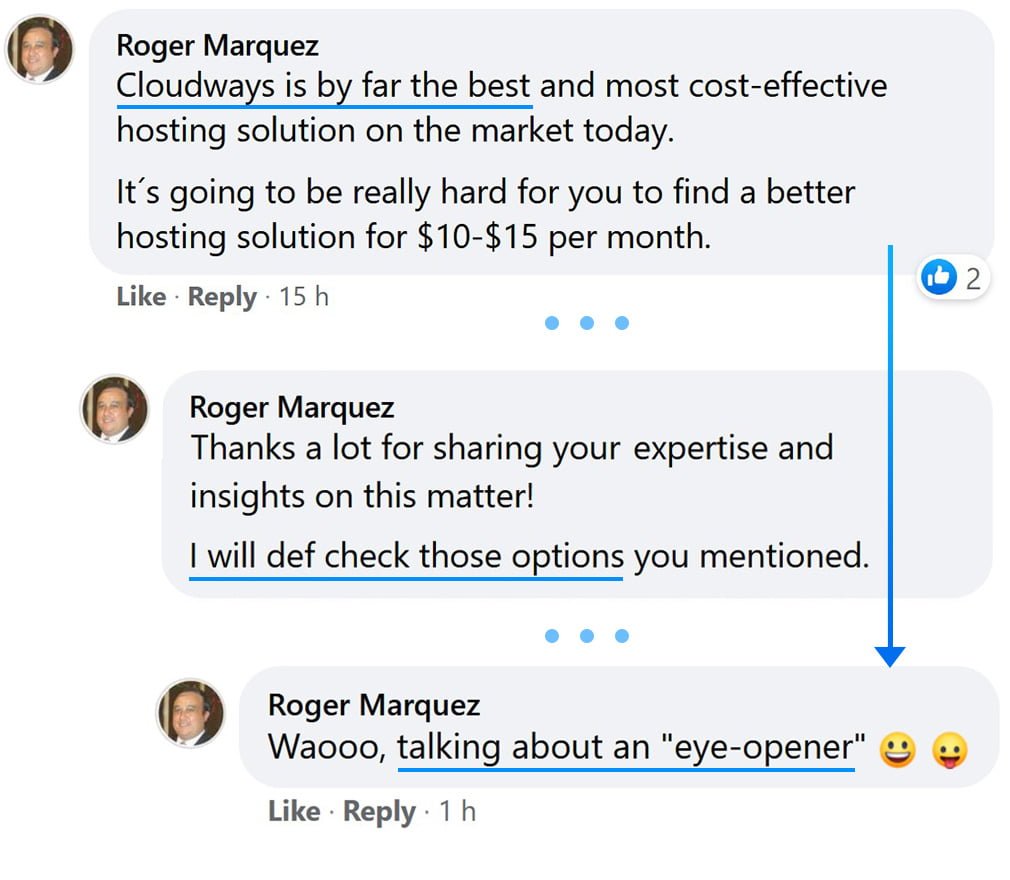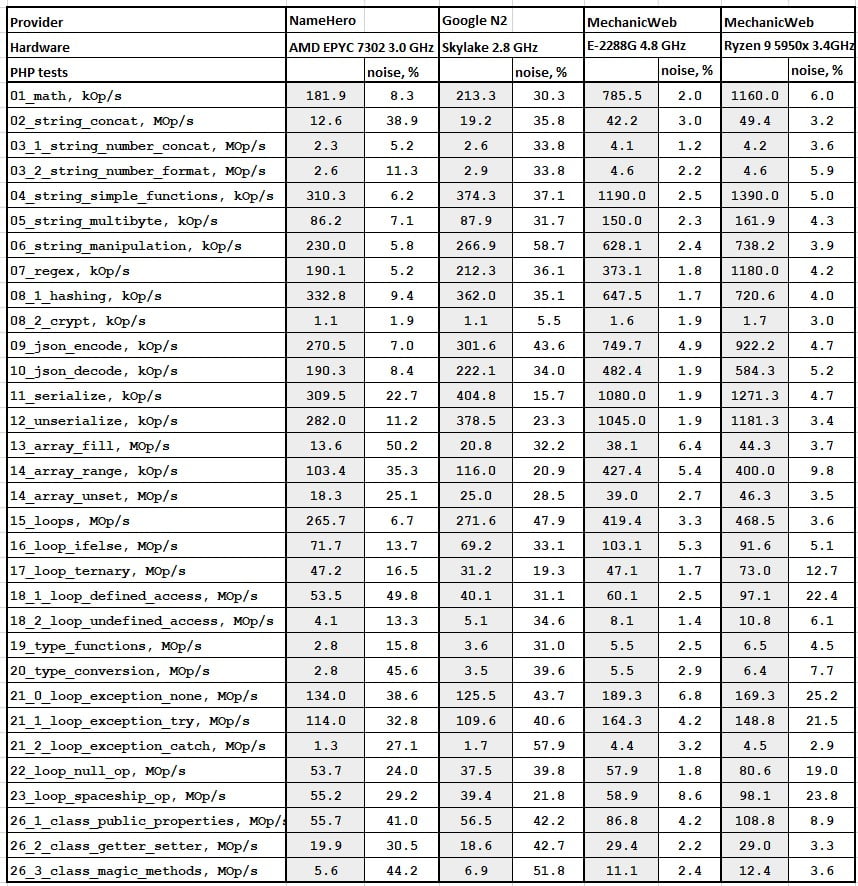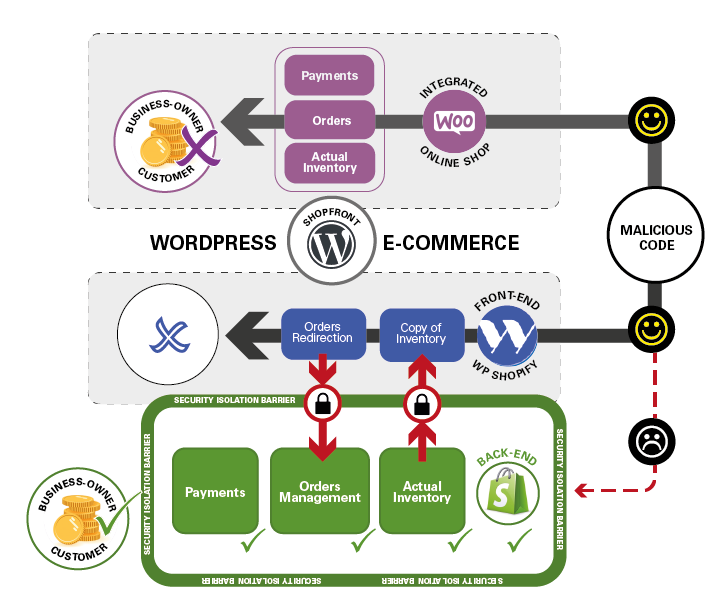Different WordPress groups on Facebook have the perfect symbiosis and coordination. This is teamwork. Some “experts” will try to convince you to switch to the “best” shared hosting plan with slow hardware, while others will try to convince you that there is nothing faster and more secure (sic!) than an unmanaged Vultr HF VPS on Cloudways. In both cases, affiliate fees are collected by misleading the unsuspecting public and convincing it to switch to the wrong service provider.
Many users are surprised to learn that there is a third option: Premium Shared Hosting providers with hardware much better than unmanaged VPSs. With cPanel, server-level malware protection, and LiteSpeed Enterprise, you get a much more secure experience and faster website loading speed from Premium Shared Hosting. For WooCommerce sites, the benefit is even greater. The best providers may not have an army of affiliate warriors behind them, but that does not mean their services are any less attractive.
But the actual picture is more complicated – the page loading time of many websites is pushed further up because of the wrong choice of the hosting providers. The classical cycle of blame, the Hosting provider – Caching plugins – Web page building tool – Web designer – Hosting provider, requires optimisation of each part of the chain.
This post provides some ideas for optimising your website’s performance by correctly choosing your hosting provider and associated infrastructure.
Cloudways is often perceived as a provider of advanced hosting services that can offer professionals the best performance. If you read our study, you will see that Cloudways excels in dubious marketing, but its services are not the best. The other hosting providers offer almost twice as fast hardware, but their services are four times less expensive.
Our benchmark study results show that you can check the performance of your web hosting plan with a few free plugins running under WordPress. Even more, benchmarking plugins for WordPress can provide an assessment of hardware speed and sysadmin capabilities. Our article discusses several FREE plugins and presents benchmarks for different hosting providers. Our review explains how to interpret the benchmark results. You can use our performance tables to quickly evaluate your current web hosting provider.
AMD EPYC 75×2 Zen 2 servers are now the base of Linode and DO’s flagship offerings of enterprise servers. Xeon Intel has lost the battle to AMD EPYC. Several shared hosting providers, like Brixly in the UK, also offer AMD EPYC 75×2. The newest Zen 3 AMD EPYC 75×3 and AMD EPYC 74×3 servers are 25% faster. They have just arrived at Vultr’s data centres. The Google Cloud Tau VMs based on EPYC Zen 3 is delivering a 50% improvement over Intel servers. AMD EPYC Zen 3 is becoming more common in data centres in the EU, the US, and the UK. Servers based on the Zen3 AMD Ryzen 9 5950x CPU are faster and significantly cheaper but have a lower CPU count of 16 cores (32 logical cores). These CPUs are 30% faster than AMD Zen 3 EPYC, and they are on par with Intel Xeon E-2388G servers with eight cores (16 logical cores). If you want the fastest and most affordable shared hosting, choose a provider with AMD Ryzen 9 5950x, cPanel, CloudLinux, and LiteSpeed Enterprise.
Cloudways’ support team forwarded our question “Is your panel undergoes an external security audit?” to Mr. Maaz, Lead Security Engineer at Cloudways. Mr. Maaz had replied: “we have not conducted the audit.” We do not doubt that Cloudways has strict internal procedures in place to demonstrate compliance with the GDPR. However, in Europe, where most agencies do not use CDN services due to ePrivacy concerns, using software panels that have not been validated by external security experts seems dubious and is much more likely to lead to litigations.
You can find security-hardened software panels like cPanel and DirectAdmin with multiple hosting providers. These platforms are continuously audited by third parties for security vulnerabilities. A careless decision to use a dubious, unproven software like Cloudways with a clear history of compromised accounts is a negligence on the part of website owners. Clearly, e-commerce website owners are responsible for any damage caused to their customers by their careless decision to use an unproven software.
As a result of a request from Cloudways, we had an hour-long phone call with their US marketing manager and developers from Pakistan to discuss our article. We have repeatedly advised Cloudways that a security audit is required. As an example, we cited the experience of another Pakistani team behind CyberPanel. It took three years for Usman Nasir’s CyberPanel to pass Rack911 Lab’s security audit. The list of problems was long, and Rack911’s opinion was relatively low, to begin with. Unfortunately, our security arguments were not taken seriously. During this conversation, it became evident that Cloudways developers were unaware that CPU resources were subject to fair use policies by the vendors. Why would you want to trust Cloudways with your security if they were ignorant of such basic information about their hardware vendors?
Shared vCPU plans were initially introduced for professional developers testing new web applications that were not yet in production. All vendors recommend limiting such plans to low-traffic sites. Developers who require root access will be fine with using shared vCPU VPS plans. Cloudways does not permit root access on their platform, however. Cloudways offers VPS accounts with shared CPU resources and without root access. It is a decent but expensive shared hosting plan disguised as something else.
The vast majority of Cloudways users have no idea what shared vCPU is. They think they are buying a dedicated CPU. They will be shocked to learn that many cloud hosting providers will offer up to 8 shared vCPUs per CPU core. vCPUs are not the same as physical processors. They represent allocated time on a thread of the physical CPU. Modern processors have two threads per CPU core. The hypervisor software schedules the vCPUs based on the available threads in the processor, allowing you to have more vCPUs than you have threads in the processor. Hosting companies are free to add even more vCPUs per physical core to oversell and dilute CPU performance. This means that there is no standard at all.
The correct wording on the Cloudways website should be “All vCPUs on and above 2GB RAM plan are 30% dedicated & 100% burstable; vCPU on a 1GB RAM plan is only 15% dedicated”. Your server may become overcrowded with Cloudways cowboys who think they can all use 100% of their vCPUs. This can cause drastic slowdowns for everyone. As a result, you will lose the ability to use burstable allowances, and your account will only have access to the dedicated vCPU portion. It is wise to keep your continuous vCPU usage below 50% of your dedicated vCPU allowance on an overcrowded server in order to handle spike loads. Therefore, you should limit your CPU usage to 7.5% on plans with 1 GB RAM and 15% on higher-tier plans.
The majority of shared web hosts described in our article ensure that your server will be underutilised so that you can still access burstable CPU resources. Their semi-dedicated shared accounts are designed for 15% to 20% dedicated CPU load, but they will offer 3 to 4 times more burstable CPUs on plans priced similarly to Cloudways. HostXNow and MechanicWeb offer plans with almost twice the CPU speed as Vultr HF. You will be able to run much busier websites on their semi-dedicated shared hosting plans.
Cloudways hides information about the shared nature of hardware resources. However, you can find it in its management panel under the Server Management > Vertical Scaling tab. It states that the 1 GB and 2 GB plans are for testing purposes and are suitable for staging websites. Production sites must be served by 4 GB plans ($50 per month) or higher. You can access Cloudways’ management panel only after you sign up for one of their plans. You will have a hard time finding a similar wording on the Cloudways website!
The incorrect wording used on Cloudways’ website when describing service offerings leads users to believe they are signing up for dedicated CPU VPS, when in fact, they are signing up for shared vCPU plans.
Here is an analogy. Consider DigitalOcean, Linode, and Vultr as the best-known brands for advanced gaming laptops with dedicated graphics cards. At some point, they all decided to release a cheap version of the office laptop – without a dedicated graphics card. Shady companies resell cheap office laptops but call them “gaming laptops” and charge much more than the office laptops are usually worth. Social media is full of exciting reviews from affiliates about how fast they can run a Solitaire game on these special edition “gaming laptops”. Many people buy these computers after reading such reviews.
As you read our full report, you will find that most VPS plans offer shared CPU resources. The best plans will offer shared CPU, but dedicated RAM and disk space. The worst plans will provide shared RAM and disk space – the same as ordinary shared hosting. The popular providers of unmanaged dedicated CPU VPS accounts is Linode, Vultr, DO, UpCloud, Hetzner, OVH, AWS, and Google. When other VPS providers offer dedicated CPUs, they will emphasise that fact explicitly. Cloudways does not offer dedicated CPU plans, but it is very vague about this.
GDPR compliance depends on how well you protect EU customers’ personal data from ransomware attacks. Cloudways offers paid Sucuri subscriptions for $10 per month for the first domain; all other domains will cost $16.5 per month per domain. If you do not find this offer, which is well hidden on Cloudways’ website, you could be accused of not taking personal data protection seriously. Failure to comply with the GDPR can result in a fine of up to 4% of your annual turnover.
Ignorant Cloudways Affiliate scammers often recommend to rely only on regularly updating all plugins and WordPress core files. Let us use an anlogy. Do you agree that the lack of antivirus software on your PC can be compensated for by automatically updating the Windows core files? Most people will say that you need to use both.
The most sophisticated affiliates recommend the free Wordfence as the only malware protection. Wordfence’s mission-critical updates are released to free users 30 days after they are released to premium users. Also, free users do not have access to the real-time IP blacklisting feature. For personal websites, free Wordfence is a compromised choice. However, it does not meet your needs if you are hosting a business website or an eCommerce website. The paid version of Wordfence costs virtually the same as the discounted version of Sucuri offered by Cloudways.
An analogy can be drawn here. You need a bank vault. Most banks hire a security company (Imunify360 / ModSecurity) to fix the vulnerable firmware in the electronic locks of the safe deposit boxes as soon as problems are discovered. One new dodgy bank (Cloudways) does not offer this service. The fine print offers its customers subsidised but still costly direct services from another security company (Sucuri). Affiliate bank vault experts strongly advise you to use the excellent services provided by the dodgy bank. They also recommend that you subscribe to the free promotional assistance of the latest security company (Wordfence), which will fix your electronic locks 30 days after a lock security breach is announced. What words would you use to describe the affiliate expert’s professional background?
LiteSpeed has created a new ecosystem with its enterprise software LiteSpeed Web Server, LiteSpeed Cache for WordPress, and QUIC.cloud CDN for the fast delivery of assets, including HTML, to end-users. You will get at least 10% or more efficiency gain on busy servers with LiteSpeed Web Server; LiteSpeed Cache is a better free alternative to paid WP Rocket for optimising your site’s page speed rating; and QUIC.cloud CDN offers the best, most sophisticated HTML edge delivery available.
LiteSpeed Cache on WordPress can be used to its fullest only if your hosting provider installs the LiteSpeed Web Server Enterprise software. If you want to take full advantage of LiteSpeed, you should move your website to an appropriate hosting provider. LS Cache plugin is an interface to the LiteSpeed Cache Engine already installed on the server by your hosting provider. The Cache Engine is waiting for your settings (including activation). So, you need to load and activate LS Cache plugin.
A server-grade system is not good without ECC memory. A corrupted database record is not something you want in an eCommerce environment. That is why professional data centers offer ECC memory on servers wih Ryzen CPU. Without ECC RAM, servers are only suitable for hosting gaming servers or for hosting brochure websites.
According to some benchmarks, the performance of the Xeon E-2288G CPU is at least 30% better than that of the Xeon E-2136. Yet data operation has improved by nearly three times between these two models, which were introduced just a year apart under the same Coffee Lake family. There is a 60% difference in PHP performance between the two models. The introduction of E-2288G processors has resulted in a significant improvement in Intel performance for WordPress hosting. Vultr is trying to add more E-2288G servers to its data centers . All dedicated vCPU plans on Vultr are deployed on outdated and slow E3-1270v6 servers. In the near future they will be upgraded to E-2288G servers or AMD EPYC 7443P Zen 3 servers, which are already overtaken by Ryzen 9 5950x and E-2388G.
AMD EPYC servers improve CPU density per server, reducing software licensing costs and data centre space rent per end-user. Estimated savings of about 30% per visitor request are reflected in cheaper hosting plans. With CPU core frequencies around 3 GHz, AMD EPYC hosting is less powerful than the options shown above but matches Vultr HF and DO Premium Intel servers offered by Cloudways. DigitalOcean and Linode are using AMD EPYC Zen 2 as their premium servers.
In fact, several well-known LiteSpeed hosting companies such as NameHero, A2Hosting, and Krystal Hosting use AMD EPYC Zen 2 servers, but none of them have had success in providing adequate performance to their users.
A2Hosting and Krystal Hosting limit their users’ disk speeds to a ridiculously low 4 MB /s. By using a dedicated database server with very high latency, Krystal Hosting further degrades the performance of each database call.
A2Hosting and NameHero use the cheapest AMD EPYC 7302 Zen 2 server. Any test related to processing math or PHP code on this CPU yields poor results. In most benchmarks, the AMD EPYC 7502 Zen 2 server is 50% faster. Based on their performance, you will assume that the 7302 server is an early botched attempt that was finally replaced by the 7502 after several years of development. However, both AMD processors were released at the same time.
It is interesting to compare the performance of NameHero’s current EPYC Zen 2 7302 server with that of Nexcess’ AMD EPYC Zen 2 7502 server (see the second table below). Nexcess is part of Liquid Web, and NameHero uses Nexcess’ servers to serve its own customers. A very similar setting performed by the same unprofessional sysadmin are used for both companies. In both the Database section of the WP Benchmarking plugin and the WP Performance section of the WPPerformanceTester plugin, the results for their servers are nearly identical and rather dull.
NameHero has abandoned their plans for upgrading to EPYC Zen 3. This was a wrong decision by NameHero because their 7302 servers were outdated even before they were released. The math calculations and string manipulations improve almost threefold when you switch from Zen 2 EPYC 7302 (16 cores) to Zen 2 EPYC 7502 (32 cores) servers. Compare NameHero’s and A2Hosting’s (EPYC 7302) with Brixly’s and Nexcess’s (EPYC 7502) data in the tables below to verify it. In the PHP processing benchmarks, EPYC 7502 shows a 50% improvement over EPYC 7302. Do not treat these servers as equals!
NameHero is known for providing great customer service. However, we don’t recommend to follow affiliate scammers’ recommendations to switch to NameHero. Affiliates get paid up to $125 by NameHero for referring paying customers and do not care about things like slow server hardware.
The AMD EPYC platform, contrary to popular beliefs on the web, is still relatively slow. You should be aware of the big performance difference between AMD EPYC and AMD Ryzen servers. If you are looking for a fast server response time, watch out for the long TTFB response time in our tests for NameHero, and Brixly (please refer to the table below). For the same uncached site, MechanicWeb’s Ryzen Zen 3 server showed much lower TTFB. Your visitors will certainly benefit from a more responsive website if you choose a hosting provider with AMD Ryzen Zen 3 servers.
PHP benchmarks show that the Ryzen Zen 3 servers are on average 30% faster than AMD EPYC 7543 Zen 3 servers, 80% faster than AMD EPYC 7502 Zen 2 servers, and 2.5 times faster than AMD EPYC 7302 used by NameHero. MechanicWeb and HostXNow are using a Ryzen 9 5950x with 16 CPU cores as the optimal AMD Ryzen Zen 3 server. AMD Ryzen Zen+ (Serwer.io) and AMD Ryzen Zen 2 (Nexus Bytes) have almost identical speed metrics to Intel Xeon E-2288G. The move to AMD Ryzen Zen 3 (Mechanic Web) shows a big jump of about 45% in server performance. AMD has taken a big step forward! However, Intel matched it with its Intel Xeon E-2388G servers, which even have an edge when it comes to performing loop operations.
Intel and AMD have crossed the already blurred line of server vs desktop processors multiple times in an attempt to overthrow one another from their crowns. Intel is now separating two families of very similar silicon dies by not enabling ECC RAM on i9 dies and rebranding silicon dies with included ECC RAM as Xeon E-2300. Desktops are sold with an i9, and servers with E-2300. Performance specifications and GPUs of both processor lines are very similar. Intel charges the same price for both processors.
With the introduction of the Xeon E-2388G processors with 8 CPU cores, Intel is catching up to the speed of AMD’s Ryzen 9 5950X. While the new Intel Rocket Lake processors are similar to the Ryzen Zen 3 in terms of speed, the price-performance ratio for Intel is still poor, as the number of CPU cores is two times lower. As a result of the fewer CPU cores, E-2388G is unlikely to win over Ryzen 5950X for shared hosting providers.
Zen 4 will bring a performance increase of at least 30%, but it will be released 12 months after Alder Lake. The new Ryzen 9 series CPUs will feature 24 cores in the AMD Zen 4 version. Both AMD and Intel will offer support for DDR5 and PCIe 5, doubling PCI Express speed and increasing memory speed by 50%. The Ryzen 6000 chips, which are already in mass production, support DDR5 using the improved Zen 3+ architecture. AMD had officially presented the new Zen 3+ Ryzen 6000 APU processors at CES 2022.
Those are great news for avid small hosting providers, but it spells doom for large web hosting conglomerates recycling old Intel processors. The speed gap in server hardware is already at least five times and will increase to almost eight times in the next two years. The decision to use old, slow hardware or pay a similar amount for modern, fast servers is entirely up to you!
You should be aware that most affiliate scammers who dominate the WordPress space will push you either Cloudways or a long list of providers with slow, outdated hardware. Of course, you’ll be presented with data proving the “fast-if-cached performance” of such providers, as well as stable service with good uptime. This is not an outright lie. Even after 15 years, old server hardware can still be functional. However, it is important to know that almost everyone who uses affiliate links has far less integrity than a used car salesman and leaves with much lower commissions. Data centers rely on them to recycle old equipment. Those involved in charities or emotionally committed to recycling old hardware should follow their advice. You will not be disappointed!
A cargo cult was described in several ethnographic studies of indigenous populations in Oceania. Multiple airbases were built on their land during the Second World War, often marking their first close contact with western civilization. Airbases such as these became abandoned after the war, and cargo planes ceased landing or airdropping supplies. Local people made attempts to imitate the behaviour of soldiers in hopes that this would prompt the soldiers and their cargo to return. The cargo cult mimicked soldiers’ daily activities and dress styles, like performing parade drills with wooden or salvaged rifles.
A similar pattern is evident among web designers. The web design community sorely misses web developers. Followers of the VPS cargo cult are mimicking web developers by moving their websites from shared hosting to a VPS in the hope that it will make their websites faster, as fast as they were in the past. In a new VPS cargo cult, efficiency is similar to what indigenous people have achieved by participating in parade drills with wooden rifles – the websites run slowly due to bloated JavaScript. The actual hosting configuration has very little to do with fixing it.
Most old-school web developers required root access to the server. Complete control of the software stack was needed for the web project to support the flexibility of software design. Web developers use VPS for a good reason – it gives them control and flexibility. A different class of professionals uses WordPress – they don’t need root access. Those who are still unsure of how to use WordPress can turn VPS hosting into a disaster.
Unfortunately, many web designers prefer to learn how to move to a VPS hosting plan instead. But why? Everyone knows that developers who were making fast websites used VPS hosting. Therefore, this is the secret ingredient! VPS hosting will make your website as fast as the one developed via hand-coding by your predecessors! What naive nonsens! If you think we are exaggerating, we were completely shocked to learn that some web designers using $200 per month GridPane management panel for unmanaged VPS accounts still use ThemeForest themes for their own websites and for their client’s websites.
Most people believe that VPSs offer greater performance and security but do not realize that managing them requires special skills and a high level of responsibility. Often, people with limited knowledge and experience in server administration suggest VPS over shared hosting. They have not yet experienced the full impact of a security/configuration nightmare. Those who have been burned jumping on the VPS bandwagon are hesitant to recommend a VPS to regular users. In the more challenging case, they recommend a managed VPS service and suggest checking if malware protection is included.
Shared hosting providers, especially those using cPanel, offer a standardised software stack. It’s ready to use out of the box for deploying production websites. Most of the features that WordPress websites need are already optimised. Security, stability, and monitoring of the server is the hosting company’s responsibility. They have more experience and expertise than most VPS users. When you choose a good company, you get stability, security, and performance from the start.
Software-as-a-service companies like Cloudways or RunCloud do not run your servers. They will not/cannot do much more than their primary software – the control panel – provides. They also don’t provide server-level malware scanning and removal services. A shared server or managed VPS provider ensures that its servers are stable and function optimally at all times. Their scope of services is not limited by installed software. They will do everything they can to ensure stability and optimal performance.
You are free to make your own decision. We provide you with benchmarks that show that many shared hosting providers offer you much faster hardware than what you can get from any cloud VPS provider. Moreover, such shared hosting providers will offer malware and security protection at a server level. VPS cargo cult followers often miss out on this massive advantage with their preferred management panels. WordPress is used on 95% of all hacked websites. Do you need any other reason to stay away from the VPS cargo cult?
Hardware resource price on Cloud Hosting is significantly higher than hardware prices for the bare-metal servers at the same Data Center. A higher cost comes from complete virtualisation services with live migrations of Virtual Machines controlled by the engineers at the Data Center. It allows them to better address patching, repairing, and updating the software and hardware without the need for you to worry about machine reboots.
The case for considering Closte services remains strong if most of your customers are outside of the major European and American hubs. By using Closte, you can physically place your server much closer to your customers, drastically reducing their wait time for dynamic requests or even static content on low traffic websites. Closte has locations in Finland, Sao Paulo in Brazil, and many Asian locations, including Seoul, Tokyo, Mumbai, Taiwan, Hong Kong, Jakarta, Singapore, Sydney, and Melbourne. Closte will undoubtedly be an interesting choice for many businesses in Asia and South America.
We advise companies in the US, Europe, and the UK to be cautious when selecting Stablepoint plans due to unpredictable hardware specifications and limited disk speed. Our benchmarks showed that their shared servers were overloaded, resulting in performance degradation. In this article, we have presented shared hosting plans with much faster hardware. However, it is a reasonable option to consider if you need to serve customers in Asia. Now that StablePoint uses dedicated EPYC Zen 3 servers in Singapore, these servers can be recommended over Closte.
Let us explain the origin of noise on Google Cloud . When Google sells you a dedicated vCPU, it simply means that the number of vCPUs issued on that server is equal to the number of threads on the processor. In other words, such dedicated vCPU is the ability to use a single thread of a physical processor without time-sharing restrictions. These vCPUs are assigned to a thread on a physical CPU core when used by operating system. There is no guarantee that your vCPU will be the only active thread on the physical CPU core. Even if your vCPU is not shared, the pysical CPU cores are. Operating systems has access to two threads on each physical CPU core.
Your vCPU will only operate at 100% if your server logical CPUs utilisation is less than 50%. From our testing, CPU utilisation on Google servers often exceeds 50% (the number of vCPUs assigned to physical CPUs exceeds the number of physical cores). Once the utilisation exceeds 50%, the performance of the vCPU on shared CPU cores drops.
What happens when your vCPU is working with another thread on the physical CPU core? Intel estimates that hyperthreading increases CPU performance by about 30% by eliminating idle time. Once idle time is eliminated, your vCPU will get 130%/2=65% of the CPU core when shared with another thread. If your server is running calculation intensive processes on the same CPU core (with no idle time), your share can drop to 50% per thread.
Once the the CPU utilisation exceeds 50%, some vCPUs experience a performance drop of about 35% (very common on Google Cloud). However we witness decreased efficiency with vCPUs performance reduced by up to 50%, which is less common but still happens.
With a dedicated server, everything is under the control of your hosting provider. Server CPU utilisation
can be proactively monitored to keep it below 50%. Such servers are referred to as underutilised. Customers hosted on an underutilised server have consistent performance regardless of the fact that they are hosted on a shared server.
With Google, you have a different business case. The usage of CPU on the server should be reduced to prevent noise in vCPU performance. But that’s the significant drop in revenue. In fact, Google sells extremely cheap vCPUs for non-time-critical computations (which have nothing to do with hosting) to increase CPU utilisation so that the vCPU noise kicks in. The cheap vCPUs are shut down and restarted when possible to keep your server CPU utilisation at a certain level. As a result, the level of vCPU noise on the Google server is the same day and night. It could have been eliminated by reducing the average load by only 10%. But Google’s revenue should not suffer!
Your provider, like Stablepoint, has no control in a “cloud” scenario. It will likely host you with noisy virtual CPUs on servers that are preloaded by Google. Stablepoint can only solve this problem by moving your account to a dedicated server. We are pleased to announce that StablePoint has moved to dedicated servers in most locations after receiving our criticism. They currently offer a dedicated EPYC Zen 3 server in London that performs much better than the very expensive Google cloud.
To assume that Google is the only culprit in the industry would be wrong. Any “cloud” provider will offer the same noisy CPU performance. As shown in the table above, we included tests performed on servers managed by NameHero, which rents its cloud resources from Liquid Web (Nexcess). Based on NameHero’s data, you can see that their servers are about 6% slower than Google’s N2 servers. That is within the noise level of their benchmarks and in perfect agreement with the results of K6 load test shown in our main benchmark tables. NameHero test data shows similar noisy performance to Google. So, “cloud” CPU resources provided by Liquid Web are also already dynamically overloaded.
The word “cloud” does not mean enterprise-level hosting anymore. Typically, it means a cluster of servers in adjacent rooms. There is a single point of failure, such as a fire, power outage, or network failure. But it also means noisy vCPUs on dynamically preloaded servers. A good shared hosting might perform better because the sysadmin team keeps it underutilised.
Cloud hosting is perceived by users as offering better value and faster. However, cloud hosting was originally designed to automatically scale geographically distributed servers. That does not make it faster or cheaper. Their value is especially questionable since vendors dynamically load their servers to keep them above 50% CPU utilisation. New dedicated bare-metal servers offered by many western data centers are twice as fast as those used by the major cloud providers. There are not many data centers with fast hardware outside the US, EU, and UK. Since many Asian data centers lack modern hardware, Google Cloud, Linode, Vultr and DO remain the preferred hosting infrastructure providers there.
All of what is described above would lead to professional communities being more interested in learning what’s going on in the LiteSpeed ecosystem and discussing the pros and cons of the various LiteSpeed hosting providers and hardware they are using for their servers. After all, there are already 5,000,000 sites using LiteSpeed. However, that’s a far cry from what you read on Facebook forums or watch on YouTube these days. The purpose of this study is to fill the knowledge gap.
It is a rare option to read a study that is not influenced by affiliate fees! Read the rest of the article to learn more about modern web hosting.
At NameHero and Cloudways, affiliates can earn up to $125 per paying customer they refer. The services offered by both companies are somewhat compromised, with NameHero choosing the slowest AMD EPYC servers. We find it insane that NameHero is willing to pay affiliates nearly 50% of the discounted three-year subscription for the Turbo Boost plan. Customers would rather have faster hardware! Still, NameHero retains the ability to bribe Cloudways affiliates like Tom Dupious. That counts to something!
Most large hosting corporations are fallen into the double trap. They are the primary Cloud services providers with the most expensive hardware resources, offering outdated bespoke software for their users.
Why are the customers still staying with them? They probably have a more urgent need to hire a knowledgeable web designer to refresh their WordPress website full of bloated code – but they ignore both issues because they don’t care enough. Ironically, Google wants them to start caring more about the ultimate page loading speed. In August 2021, many users have found their Google ranking crashed due to low Page Experience signals for their web pages. It is a painful way to force people to look around and find the ugly truth about large hosting corporations – they just lost track.
Now is the critical time for smaller hosting companies to offer better service to the customers. It is easier for smaller companies to understand their clients better. And decide to throw away all bespoke software development performed to optimise the Nginx servers. As they are a small team, they can make such a decision with less hesitation. They have a smaller number of clients compared to larger companies. The same people provide support to the same clients. In time the support team gains a better understanding of client requirements and show more empathy for resolving their problems.
With the current price pressure to stay under $20 per month, LiteSpeed plans in the $10-$15 range with cPanel, NVMe SSD drives, and great customer service are the best choice. In a race to the bottom, development teams will need to downsize. Making a brave change to their outdated business model is painful. It is a big personal drama for many managers and software developers. Its something you never want to experience yourself. It is a coming bloodbath. Not all hosting companies can survive for the next few years.
Make sure you don’t fall into a scammer’s trap when considering NameHero. The server has a 3.3 GHz AMD EPYC 7302 processor and DDR4-3200 memory. This might seem like a great deal, but the AMD EPYC 7302 has a very weak CPU, which will not handle demanding workloads. NameHero had abandoned plans to offer AMD EPYC Zen 3 servers. As of right now, MechanicWeb has almost 2.5 times the speed of NameHero. The trade-offs do not work out in NameHero’s favor since a fast site can increase conversions!
A hosting provider will monitor that his servers are underutilised to avoid slowing down your neighbours hosted on the same server. Different providers use various metrics for establishing an Unacceptable Resource Usage policy.
Providers of shared CPU VPS may force you to upgrade if you consistently use more than 30% of the CPU resources listed in the package specification. HostXNow, Brixly, and MechanicWeb, however, do not limit your activity that severely. As a result, their users would be able to consume more CPU power than traditional VPS users with the same number of CPU cores. We hope that such a benchmark will protect you from the influence of followers of the VPS cargo cult.
All of the above should be explained further. Most users in a shared hosting environment are buying resources they don’t need. Most people overestimate their traffic and resource consumption. This is even more so for fast servers using the latest hardware. Thanks to LiteSpeed Web Server’s server-level full page caching, you can deliver most content without touching your resource allocation. A static brochure website uses server resources primarily for editing rather than serving visitors.
Consequently, users with higher resource consumption may find that their hosting provider tolerates their behaviour. The fair CPU usage for most shared hosting accounts is about 5%, whereas it could reach up to 20% for the most expensive semi-dedicated hosting plans. In practice, however, you can draw much higher sustained CPU loads at the expense of your neighbours who run zombie accounts. A responsible host provider will ensure that the CPU usage on the entire server is below 50%. If this figure is exceeded, more proactive steps will be taken to police unfair resource usage.
Reseller Hosting is available from many providers. HostXNow, MechanicWeb, Brixly, and Stablepoint serve web agencies wishing to offer branded hosting to their clients. The services are similarly priced and offer various hosting options, ranging from 20 to 250 accounts. To make the best decision for your clients, be sure to review the details carefully.
There are many web designers who offer no-frills hosting services to their clients. Unlike larger web agencies, they do not need automatic billing and do not know the benefits of setting up separate cPanel accounts for each client. However, reseller hosting is the ideal business practice to provide the best security to their clients. In a hosting environment, cPanel accounts are isolated using CageFS. Domains on the same cPanel account are not isolated. They just store their files in different folders. The security and stability are drastically improved with CageFS. Using different cPanel accounts isolates per-client resource consumption and theoretically improves stability when all sites experience a traffic spike at the same time.
However, please keep in mind that reseller hosting is very cheap, so you should not sign up for it unless you are confident in your technical abilities. Only shared hosting accounts come with “handholding” technical support. It is not recommended that novice users try to set up an agency with cheap reseller plans. You might be better off upgrading your skills on a shared hosting plan before moving to the reseller plan.
It would be helpful if you were aware that the reseller plans presented above offer a much more efficient software stack based on LiteSpeed Web Server Enterprise, which also provides full protection against “brute force” login attacks. Additionally, the hosting providers offer malware scanning and web application firewalls (WAF) – imunify360/ModSecurity at HostXNow and Stablepoint, imunifyAV+/CSF WAF at MechanicWeb, and BitNinja Security Firewall and BitNinja SiteProtection with real-time malware removal at Brixly. Cloudways does not offer such protection. Their offer is to spend $16.5 per month per domain for Sucuri – that’s an extra $1.65k per month!
Each of about 50-100 cPanel accounts on the reseller plan will be capable of serving about the same number of visitors compared to the entire Cloudways plan. The CageFS isolation further improves security for each child account. Any person recommending that multiple domains are best hosted on the shared vCPU Cloudways plans is missing the necessary skills to analyse different hosting options or is a pure scammer driven by the affiliate fees from Cloudways.
Also, be careful with your expectations! Your entire reseller account with 100 child accounts should aim to continuously use only slightly higher than 6 GB RAM and 1 CPU. That is still more than the Cloudways plan, which should consume no more than 0.6 CPUs continuously (30% out of 2 shared CPUs). Provisioning 2 GB RAM / 2 CPUs per child account is for peak loads only! If you have a client with a successful eCommerce website, you must consider semi-dedicated shared hosting instead of putting them on heavily oversubscribed reseller hosting accounts.
When you have several websites with occasional high CPU load requirements, HostXNow is one of the most competitive offers available. HostXNow’s ultra-fast server and significant CPU and RAM resources per child account allow hosting busy websites that were previously not possible through Reseller plans. However, be realistic about your expectations. If you need continuous high CPU utilisation, you should use a VPS instance with dedicated CPUs instead of a Reseller plan. You should aim for a continuous CPU load of less than 3 CPU hyperthreads for the entire Agency Reseller account, so plan accordingly!
Providers are able to offer low-cost reseller plans because resellers mainly work with simple brochure websites. The LiteSpeed Cache Engine caches such sites on the server, so child accounts are rarely accessed except for editing content and updating plugins. Server resources are grossly oversubscribed. A reseller hosting server with 16 CPU cores (32 hyperthreads) can have about 1,000 cPanel accounts. The fact that your account can access up to two CPU hyperthreads does not mean that you can use them continuously. Even a continuous utilisation of 5% of the CPU hyperthread on the child account can cause problems on such an overloaded hosting server. A reseller service must be offered on fast, modern servers that can partially compensate for the overcrowding of reseller servers. Using Ryzen 9 5900x provides 30% faster performance than the AMD EPYC Zen 3. You can purchase reseller hosting on Ryzen Zen 3 servers from MechanicWeb in the UK, USA and Germany, as well as from HostXNow in the UK and USA East Coast, and StablePoint in the USA West Coast.
When serving websites that require occasional high bursts of CPU usage, HostXNow is a good choice for clients based in the UK and USA, East Coast. They offer one of the best performing server options in the market with the Ryzen 9 5900x servers. Their resource allocation of up to 8 GB RAM and 4 CPUs per child account is unmatched by their competitors.
As cPanel prices have risen, many shady vendors are using so-called “bypass” licenses. This is a serious problem. By using illegal cPanel licenses, such providers can offer reseller hosting at unrealistically low prices. There are some providers that offer reseller hosting with 50 cPanel accounts for $15 or less. Using a bypass license means that the cPanel’s automatic update request is handled by a malicious server that can gain full access to your hosting server. Anything hosted by such providers is insecure and illegal.
We invite active participants of numerous Facebook groups to express their views.
When websites attract heavy traffic, they overwhelm the provider’s hosting capacity. Adding a CDN service is an excellent way to get your website in front of more people and grow your audience. If you have a website with high traffic, then we recommend giving BunnyCDN a try. It will store a permanent cache of your website’s static files like CSS, JS, and images in its Geo-Replicated Perma-Cache servers. These servers will provide your files to the cache of 30 servers located around the world, shielding your origin from traffic. Your origin server will be left with the task of delivering HTML files to visitors, reducing the bandwidth load at your origin by a minimum of thirty times. BunnyCDN services cost you about $1 per month. It is a much better option than upgrading the level of your subscription with your original hosting provider.
Through our comprehensive solutions, we can help your business from logo designs to designing eCommerce stores. We provide a range of services, including technical SEO and relocation assistance to better web hosting. With our graphic design expertise, we are prepared to meet any other creative need that may arise.





















